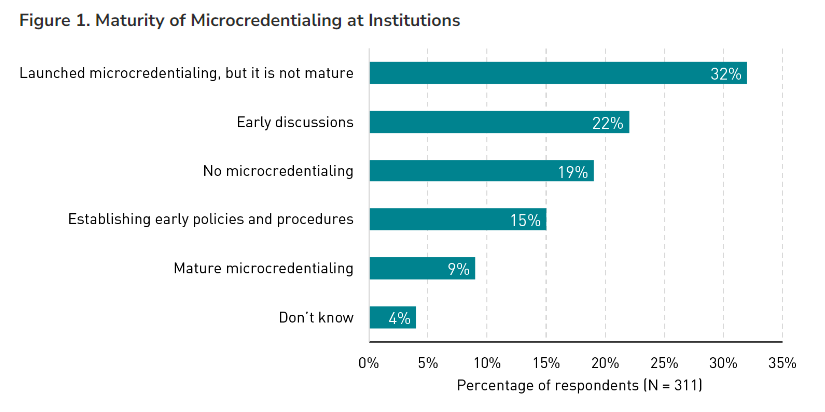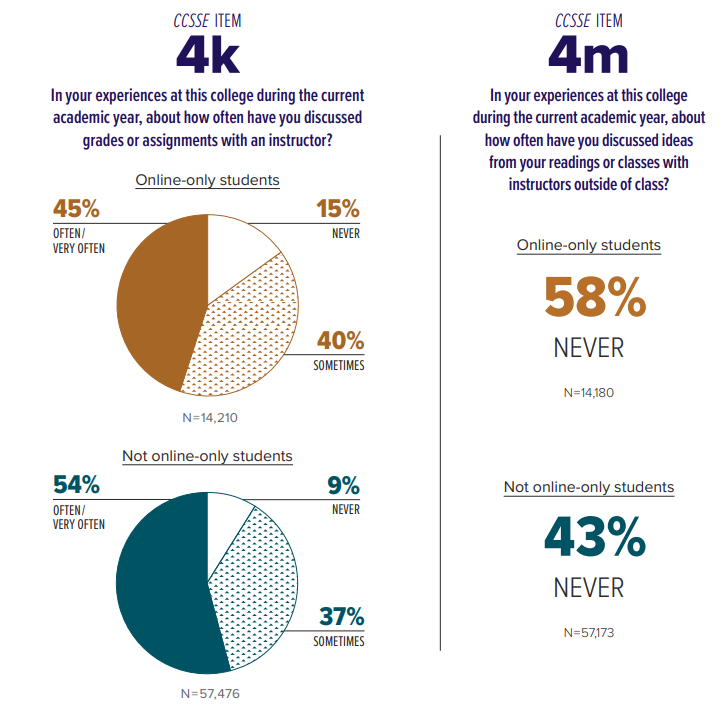Commentary
I have found two recurring themes in our research. The first is that learners face dozens of choices regarding their educational journey. The paradox of choice is a genuine issue for some. I found this learner's commentary on the subject and thought it was interesting to hear a learner's perspective.
The second recurring theme is the lack of a common glossary of terms to describe higher education functions and practices in the United States; this contributes to learner confusion. This theme is particularly true for learners who attend more than one
institution on their journey through higher education. For example, the terms course, class, and section can all mean the same or different things, depending on the institution. We shared the working definitions below from a recent report on the Measures
of Effectiveness for an Undergraduate Schedule of Classes.
- Course: Details reside at the catalog level and include title, level, description, course learning outcomes/performance objectives, pre- and corequisites, type, etc.
- Class: A course from the catalog built into a schedule available for registration for a particular term. A course may be scheduled as a class several times during a term.
- Section: Some institutions use section in their schedule to differentiate multiple offerings of the same class taking place at the same time. Others use section as a standalone term, with the same definition as class above.
This topic was addressed at the institutional level in this Inside Higher Ed article.
AACRAO is interested in creating a national-level glossary of common terminology and definitions. We are in the early stages of conceptualizing this and examining ways to encourage the use of common terms. We believe common terminology would help
support learners and learning mobility. The latter is a Signature Initiative for AACRAO.
AACRAO Research Update
Upcoming Report Release and Webinar
We believe there are increasing opportunities for professional and continuing education and traditional academic programs to work together to enhance learning mobility, improve college access for undergraduate adult learners, and support institution-wide
learner success. However, to embrace these opportunities, we must first understand the degree to which professional and continuing education and traditional academic programs currently operate in collaboration or competition for students and/or institutional
resources. To that end, AACRAO and UPCEA partnered on a survey of their respective undergraduate-serving institutional members in the United States. The report Collaboration, Competition or Convergence? – The relationship between professional
and continuing education and traditional academic programs will be released on July 18. Please register for the webinar, then watch your inbox for this report in the coming weeks.
Currently Deployed
The Adult Learning Mobility survey is currently deployed to AACRAO members from the U.S. and Canada. The survey will close on July 11.
Current Higher Education Research and Related Topics
Early Look at Student-Voice Survey on Student Stress
A recent article previews data from the latest Student-Voice survey by Inside Higher Ed and College Pulse. Three out of four students believe stress negatively impacts their ability to focus, learn and perform well in school. The survey also asked students who they believe is responsible for helping them address stress and mental
health issues. Their perspectives are summarized below:
- 40% of students state professors should play a role in alleviating stress
- 45% say professors bear a responsibility to help students struggling with mental health
- 50% of students believe their physical health and wellness are negatively impacting academic success
- nearly 75% of students want to reduce stress, making it the top wellness objective among students
Survey Examines Data Use in Higher Education Business Decisions
Colleges and universities are progressing in using data to steer business decisions, boost efficiencies and improve their ability to meet market expectations. A survey by TouchNet and Higher Ed Dive's studioID revealed that most respondents rely heavily on various factors to steer business decisions. These include data insights, hunches, educated guesses, peer
input, and experience. When asked what functional area within an institution they would like to improve data capture, access, and/or reporting, 44% chose enrollment and admissions, 41% chose financial services, and 35% chose student engagement.
Incomplete or disconnected data remain a barrier to extracting more from data; 83% state it would be "very" or "extremely" helpful to have a single source of truth for unified data across systems and departments. Additionally, 80% believe mobile access
to data insights and the ability to log into a centralized dashboard would be helpful.
Educause Quickpoll Examines Microcredentials
Microcredential programs are gaining momentum, but higher education professionals still lack the resources to define, design, deliver, support, and/or evaluate programs. A survey asked educational technology professionals about their institutions' current state of microcredential programs.
- Data suggest microcredential programs are in their infancy; only 9% of respondents have mature programs (Figure 1).
- Institutional leaders see value in microcredentials, but institutional silos and lack of funding can hinder advancement.
- Microcredentialing programs are available in multiple programs or departments but are not yet offered institution-wide.
- Fully developed programs are more likely to operate at a larger scale.
- The intended audience for microcredentials includes current undergraduate and graduate students, prospective students, faculty and staff, alums, and recipients of employee education benefits.
Figure 1: Maturity of Micro credentialing at Institutions

Source: EDUCAUSE and WCET QuickPol, 2023
Higher Education Value Questioned by Over Half of Adults Who Attended
An article in Higher Ed Dive outlines the results of the Federal Reserve's annual survey on U.S. financial well-being, released in May 2023. The survey found the following.
- Over half of adults who attended college said the lifetime financial benefits of their higher education outweigh the costs.
- 20% of adults suggested higher education wasn't worth the costs, while 80% said the associated benefits and expenses were about the same.
- Satisfaction rose with the degree attained; 68% stated college was financially worthwhile.
- Adults aged 45 and older generally consider their education valuable enough to warrant the cost.
- 43% of adults with outstanding student loans said the financial benefits of college outweigh its costs; 53% of those who had paid off their student loans or never took on debt said the same.
- Students who attended private nonprofits were the most likely to say their education was worth the cost.
- Only 9% of people who went to college said they would take fewer classes or skip college altogether if they could do it over.
How Institutions of Higher Education Enhance and Hurt Student Mental Health
Colleges and universities have significant responsibility for the mental health of their students. Stressors harm students' social and emotional well-being. Students of color and marginalized groups bear a disproportionate share of this burden. Various
factors, such as contentious politics, state violence, wealth disparity, and pandemics, are external. Still, colleges and universities bear significant responsibility for how their students feel and perform.
A report from the College Futures Foundation examines how various measures by institutions help and hurt student mental health. For
example, to improve student mental health, institutions should consider focusing on individual self-care, connections, belonging, culturally pertinent curricula, affinity spaces, and campus art. Additionally, it was reported:
- Curricula should prioritize the well-being of students from diverse backgrounds and provide culturally pertinent mental health programming.
- Colleges may contribute to student mental health problems by:
- promoting social isolation
- maintaining hostile climates
- perpetuating excessive competition
- worsening financial insecurity
- creating barriers to support
Research Examines Student Engagement of Online Students
| Colleges are modifying online offerings to serve virtual students better. A CCCSE research report based on a survey of 83,000
students indicates a correlation between higher levels of student engagement and higher GPAs. Faculty engagement with online and traditional learners was also examined (Figure 2). Key data points include:
|
- Online-only students were more likely to be:
- nontraditional
- part-time
- working 30 or more hours a week
- Fully online and traditional students are equally committed to their success.
- Fully online and traditional students benefit similarly from services such as academic advising and career counseling.
- Online students were more prepared and less likely to skip class than their in-person counterparts.
- 87% of online-only pupils never miss class, compared to 64% of in-person students.
- Online-only students reported instructors' examinations were more difficult and expectations were higher.
| Figure 2: Instructor Engagement

Source: The Online Student: Impact of Course Modality on Engagement, CCCSE, 2023
|
Long-Term Effects of the Pandemic on Student Behavior
A new report from EAB provides
insight into the mentality of students whose behaviors in college were influenced by their experiences during the pandemic (referred to as "Gen P"). This report draws from various sources, including the EAB's 2023 Student
Communication Preferences Survey results, which included responses from over 20,000 high school students. Interestingly, prospective students' mental health issues are a growing concern (Figure 3).
Figure 3: Mental Health Increasingly Guiding College Choice
.png?sfvrsn=e2202cf5_1)
Source: Recruiting 'Gen P': 6 Insights into How the Pandemic Has Altered College Search Behavior from EAB's Survey of 20,000+ Students, EAB, 2023
Exploring What Students Want From Online Learning
A report from McKinsey & Company examines which learning models higher education
students prefer and why; this includes what they find satisfying about online education and which elements of the online learning experience they value most. Many students are dissatisfied with their online experiences, signaling that higher education
institutions could benefit by evolving online learning models. The survey also identified eight areas that direct the online learning experience (Figure 4).
Key points include:
- Almost 65% of students surveyed wanted aspects of their learning experience to remain virtual.
- Many students hesitate to enroll in fully remote programs, citing:
- fear of becoming more distracted by studying online
- becoming bored if the learning experience is not motivating
- their perceived lack of personal discipline to complete the online program
- Social aspects also shape attitudes toward in-person, hybrid, and fully remote models.
- Three tenets of successful online programs emerged:
- basics still matter
- expensive features are not necessarily valued
- student age and program type do not significantly influence the perception of the quality of the online learning experience
Figure 4: Dimensions Shaping the Online-Learning Experience
.png?sfvrsn=f888bd6_1)
Source: What do higher education students want from online learning?, McKinsey & Company, 2023NACUBO Report on Student Financial Services
The Student Financial Services (SFS) Policies and Procedures report investigates policies and procedures used by student-financial-services operations. NACUBO institutions can access the report for free here. This triennial survey collects data on student services, collection policies, accounts receivable, write-off policies, financial-responsibility agreements, Veteran Affairs, financial literacy of students,
integrated services, and student-information systems. Results include:
- Institutions increasingly employ electronic financial services:
- 92% utilize ACH (Automated Clearing House) payment
- 79% provide virtual meetings
- 77% of institutions levy late fees, with an average late fee of $71.78 for undergraduate accounts with a balance of $1,000 more than 60 days past due.
- Nearly 69% of respondents restrict access to official transcripts based on unpaid fees; 25% employ a minimum registration-hold threshold.
- 70% of institutions have financial-responsibility agreements; 13% are in the process of implementing them.